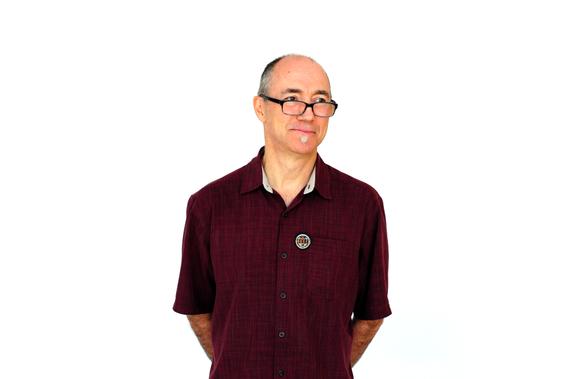Peter Thomson
Livable Planet Editor
Livable Planet Editor Peter Thomson has covered the broad swath of issues related to the environment and global sustainability for more than 25 years and has headed up The World's coverage since 2008. He's the author of the acclaimed book "Sacred Sea: A Journey to Lake Baikal," about the world's largest and deepest lake, the co-owner of a super-efficient, 100 year-old Boston triple-decker, and the father of a very curious young daughter.
Peter Thomson has been covering the broad swath of issues related to the environment and global sustainability for more than 25 years and signed on as The World’s environment editor in 2008. In 2017 he initiated the transition of the program's Environment desk to the Livable Planet desk. (Meet our new Livable Planet desk. It’s about what we need to have a future.) Peter's a public radio "lifer" who got hooked on radio journalism in high school, while listening to and then interning with Danny Schechter the News Dissector at Boston's legendary WBCN. From college radio at WYSO and WMUA and detours through such promising alternate career paths as bike messenger, oyster shucker, DJ, substitute teacher and housepainter, he worked his way into his first reporting position at WFCR in Amherst, Massachusetts and soon became a regular stringer for NPR. After stints at WBUR and Monitor Radio in Boston he signed on as the founding editor and producer of NPR’s groundbreaking new environmental news program Living on Earth, in 1991. In nearly 10 years at the program, Peter helped establish Living on Earth as the preeminent broadcast source for environmental news and helped the program earn numerous awards and honors. He also reported for the program on issues from oil and natives on Alaska’s North Slope to solar power development in rural Morocco. In 2000 Peter left Living on Earth to travel around the world by surface with his brother via Siberia, from which he was lucky to escape with enough material to turn into his acclaimed 2007 book Sacred Sea: A Journey to Lake Baikal, about the world's largest, deepest, oldest and most ecologically unique lake. Sacred Sea was dubbed “superb” and “compelling” by the New York Times. His favorite work to date, though, is his radio documentary about a hot dog stand in Oakland, California, Original Kasper's: The Hot Dog Stand that Saved a Neighborhood. Peter's work has received more than two dozen awards, including a 2016 AAAS Kavli Science Journalism Gold Award for audio. He’s been a fellow at the MacDowell Colony in New Hampshire, the Rockefeller Foundation’s Bellagio Study and Conference Center in Italy, the National Center for Atmospheric Research, the Marine Biological Laboratory, the Institute for Journalism and Natural Resources, and the International Reporting Project, with whom he traveled to China in 2010, and in 2014 received a fellowship from the Heinrich Boell Foundation to report on advances in renewable energy storage technology in Germany. He served 15 years on the board of Directors of the Society of Environmental Journalists, 10 years on the advisory board of the Metcalf Institute for Marine and Environmental Reporting, and five years on the advisory board of the Institute for Journalism and Natural Resources. Peter lives in a super-efficient, Deep-Energy-Retrofitted 100 year-old Boston triple-decker with his wife, Edith and his very curious young daughter, Eleanor. He is often found nursing one basketball injury or another but doesn't have the sense to stay off the court.
Federal scientists’ report says climate change is dangerously real
In a direct challenge to the positions and policies of the Trump administration, a leaked draft of a scientific report from 13 US federal agencies says there’s no doubt humans are largely responsible for climate change. It warns of the stark consequences now and in the future.
Subscribe to The World’s Latest Edition podcast for free using your favorite podcast player:



